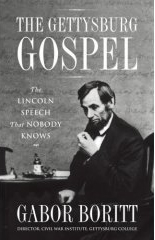 THE GETTYSBURG GOSPEL: THE LINCOLN SPEECH THAT NOBODY KNOWS (Simon & Schuster) By Gabor Boritt
THE GETTYSBURG GOSPEL: THE LINCOLN SPEECH THAT NOBODY KNOWS (Simon & Schuster) By Gabor Boritt
Part of Boritt’s book places Lincoln’s Gettysburg Address nicely within a historical context that I never knew about. Starting with 1863 and moving forward, Boritt examines how Lincoln’s words were interpreted and remembered. How they were used and how each generation saw his words in a different light.
However, first Boritt reconstructs exactly what transpired for Lincoln and the people of Gettysburg leading up to the ceremony. The first chapter describes the grisly scene as the two armies left in their wake a ravaged countryside. The dead lay in the open, animal carcasses stacked along the road putrefied in the hot July sun. The smell of stinking flesh and the infestation of thousands of flies. The town had to clean up the mess left behind from both armies. Boritt’s intimate portrait of the town and its people is engaging and enlightening. Boritt’s research of the events and circumstances surrounding the Soldiers National Cemetery and of Lincoln’s address is meticulous.
But as the book turned to how Lincoln’s words were interpreted from generation to generation, Boritt’s writing truly soars. Addressing issues such as race, white and black interpretation, and growth of the “Lost Cause†myth, Boritt raises interesting questions about how our nation remembers the past.
This is a fine book that completely succeeds and was a joy to read.
I want to share two quotes from the book:
“A generation had to pass before his ‘few appropriate remarks’ grew into the Gettysburg Address. Out of the sacred space the sacred text would grow. Late in the century, Americans would rediscover Lincoln’s remarks in their own right, call them by the name we still know, begin to turn the text into a revered document, and find the meaning of their country there. In the twenty-first century, Americans are still saying this is who we are.†(p.161)
“Among the reasons for the emergence of Lincoln as a national symbol and the rise to prominence of the Gettysburg Address were the abandonment of Reconstruction and the need to find a substitute for the Emancipation Proclamation; the growth of a more modern language; the need to Americanize immigrants; and, above all, the democratizing of Progressive politics.†(p.191)
Hi, I decided to sample the web and ran into your review and wanted to say thank you. Gabor Boritt